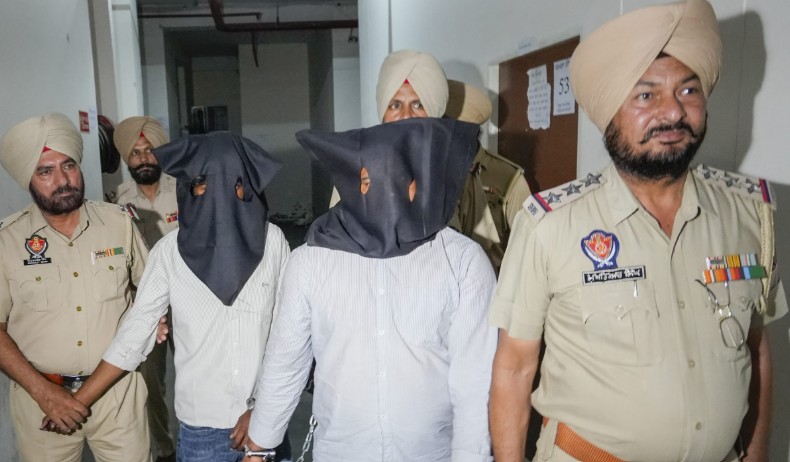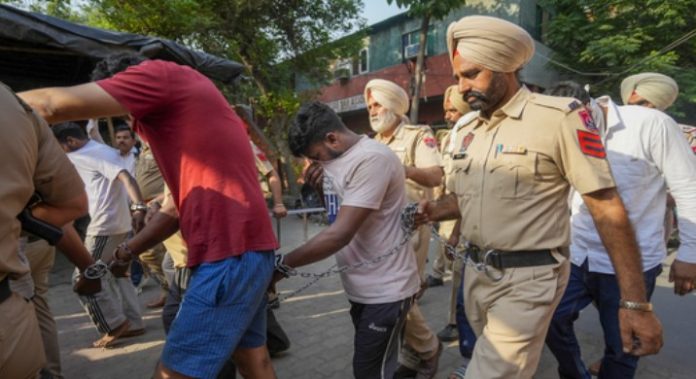In a significant development with potentially far-reaching implications for national security, the Punjab Police have apprehended two individuals on serious charges of espionage. The arrests, made following a meticulous intelligence operation, underscore the persistent threat of foreign-sponsored activities aimed at undermining India’s sovereignty and internal security. While specific details regarding the identities of the arrested individuals and the nature of the sensitive information they are alleged to have compromised remain under wraps as the investigation unfolds, the arrests highlight the crucial role played by state police forces in counter-espionage efforts, often working in tandem with central intelligence agencies.
The operation, reportedly conducted by a specialized wing of the Punjab Police, culminated in the apprehension of the two suspects from undisclosed locations within the state. The timing and coordinated nature of the arrests suggest that the police had been tracking the activities of these individuals for a considerable period, gathering sufficient evidence to warrant their detention. The charges of espionage typically involve allegations of collecting, possessing, or transmitting sensitive information, such as classified documents, strategic data, or details pertaining to national security installations, to unauthorized individuals or foreign entities.
While the Punjab Police have yet to release a detailed statement outlining the specifics of the case, sources within the law enforcement community indicate that the investigation was initiated based on credible intelligence inputs suggesting the involvement of these individuals in activities detrimental to national interests. The nature of espionage can vary widely, ranging from the clandestine передача of physical documents to the more modern methods of digital infiltration and the передача of information through encrypted communication channels. Given the current geopolitical climate and the sophisticated capabilities of state and non-state actors involved in intelligence gathering, it is likely that the investigation will delve into the methods employed by the accused, their potential handlers, and the intended recipients of the compromised information.
The fact that the arrests were made by the state police highlights the increasingly decentralized nature of counter-espionage efforts in India. While central agencies like the Intelligence Bureau (IB) and the Research and Analysis Wing (RAW) play a pivotal role in gathering intelligence and coordinating national security matters, state police forces often possess crucial local intelligence networks and the on-ground presence necessary for the effective apprehension of suspects. This collaborative approach underscores the importance of seamless information sharing and operational coordination between federal and state law enforcement agencies in safeguarding national security.

The implications of espionage activities can be severe, potentially jeopardizing national defense capabilities, compromising strategic infrastructure, and undermining diplomatic relations. The information sought by foreign entities can range from military deployments and technological advancements to sensitive political and economic data. The передача of such information can have far-reaching consequences, affecting not only national security but also economic stability and international standing.
The investigation into this case is expected to be complex and multi-layered. The police will likely focus on establishing the motives of the accused, the nature and sensitivity of the information they allegedly передача, the identities of their handlers or recipients, and the extent of the damage caused by their actions. This will involve a thorough examination of their communication records, financial transactions, travel history, and any digital devices they may have used. Cyber forensics will likely play a crucial role in uncovering any digital footprints left by the suspects.
Given the serious nature of the charges, the arrested individuals are likely to face stringent legal proceedings under relevant sections of the Indian Penal Code and potentially the Official Secrets Act, which deals specifically with espionage and related offenses. The legal process will involve their production before a magistrate, potential remand in police custody for further investigation, and eventual trial in a court of law. The prosecution will need to present compelling evidence to prove their guilt beyond a reasonable doubt.
The arrests also serve as a timely reminder to the general public about the importance of remaining vigilant and reporting any suspicious activities that could potentially have national security implications. In an increasingly interconnected world, the threat of espionage is ever-present, and citizens play a crucial role in being the eyes and ears of the nation.
For the Punjab Police, these arrests represent a significant achievement in their ongoing efforts to maintain law and order and safeguard the state’s security. Punjab, being a border state, often faces unique security challenges, including cross-border threats and the potential for anti-national elements to operate within its territory. The successful apprehension of individuals involved in espionage activities demonstrates the capability and commitment of the state police force in addressing these complex security threats.
The investigation is still in its early stages, and further details are expected to emerge as the police continue their inquiries. However, the arrest of these two individuals on espionage charges sends a clear message that any attempts to undermine India’s security will be met with swift and decisive action by law enforcement agencies. The case will undoubtedly be closely monitored by security analysts and the public alike, as it underscores the ongoing challenges in maintaining national security in the face of evolving threats. The focus now will be on ensuring a thorough and transparent investigation that brings the truth to light and ensures that justice is served.


